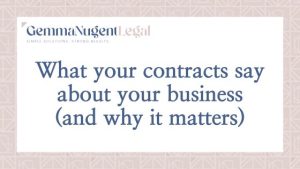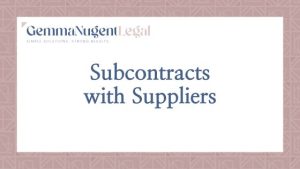We’ve all had those moments where we try to save time and money by doing something ourselves instead of calling in the experts. Sometimes it works out brilliantly. Other times… well, not so much. Like the time my husband (*cough* co-owner of one of Perth’s top commercial flooring companies) decided he could rip up our old engineered floorboards himself in one weekend with a jackhammer from Kennards. The demolition crew we hired a week later to finish the job nearly keeled over laughing. But that’s a story for another time.
What I want to talk about today is what happens when people take the same DIY approach with contracts. Let me give you a recent example that I experienced with one of my clients.
The “Quick Check” request
Recently, a client got in touch asking if I could “cast my eyes over” a contract they’d cobbled together for a new service their business was launching. You probably know the kind of message: “We’ve put together something that looks pretty good, we just need a quick legal check before we send it out tomorrow.”
They were confident it would pass review without a hitch.
Reality check
What people don’t realise is that a “quick check” nearly always takes twice as long as drafting a proper contract from scratch. Why? Because patching up a flawed contract is a bit like trying to renovate a house that’s been built on sand. Every fix-up reveals another crack.
This one was no different. A quick read revealed a list of serious issues that could have landed the client in a world of pain.
There were no limits on liability. No exclusions for consequential loss. No rights to assign debts for collection. No process for suspending work if payments were late. Basic protective mechanisms that should have been there were completely missing
On top of that, the payment terms were a mess. There was no clear process for making a claim, no timeframes for when invoices could be sent, no deadlines for payment, and confusing GST references that could have led to very awkward conversations when the final bill came in 10% higher than expected. There was also no right to recover debt collection costs.
Structurally, the contract was all over the place. The party names were inconsistent. Different terms were used for the same concepts. Capitalised terms were thrown in without being defined (a clear sign bits had been copied and pasted from other agreements). There was outdated legalese like “shall” and “notwithstanding anything herein contained,” broken cross-references, and formatting that made it hard to follow.

Confession time
When I walked through all this with my client, she admitted she’d stitched the contract together using bits and pieces from old agreements, generative AI and examples she found online. Her heart was in the right place; she knew a contract was a good idea, but she just wanted to save time and avoid legal fees.
There’s a better way
Rather than trying to fix the Frankenstein draft, I suggested we start fresh. I drafted a new contract, tailored to her business. It clearly set out the commercial terms, protected her interests, addressed risks she hadn’t considered. Most importantly, it was written in plain English that everyone could understand. It also looked professional, which matters more than people often think.
A smarter contract, a stronger business
When I sent through the new draft, my client’s response was that the difference was “night and day.” She admitted she hadn’t realised how much she didn’t know until she saw it laid out properly. Beyond tightening the legal terms, the process helped her spot gaps in the pricing model for her new business offering. The structure of the contract I created made it easier to attach to quotes, and to set clear expectations with customers, like who was responsible for what, and when additional services would attract extra charges. It turned out that the contract wasn’t just about reducing legal risk; it became a tool to clarify the business model and support better client relationships.
The bottom line
Yes, getting a proper contract drafted by a professional costs more upfront. And yes, it takes more time than pasting together a few clauses from Google and ChatGPT. But it’s an investment in the long-term health of your business. A solid contract can save you thousands down the line, not to mention sleepless nights.
You wouldn’t build a house by copying random plans off the internet. So why build your business’s legal foundations that way?
Got “New Contracts” on your EOFY To-Do list?
If you’ve got a DIY contract sitting in your drafts, or you’re thinking about creating one, let’s chat. I’d much rather help you build something strong from the start than try to salvage it when things go wrong.
And with the end of the financial year just around the corner, now’s a great time to tick this off your list. Especially if “refresh contracts” was on your FY25 goals and there’s still budget available! I’ve got limited space for drafting projects before the EOFY rush hits, so reach out if you’d like to secure a spot.






